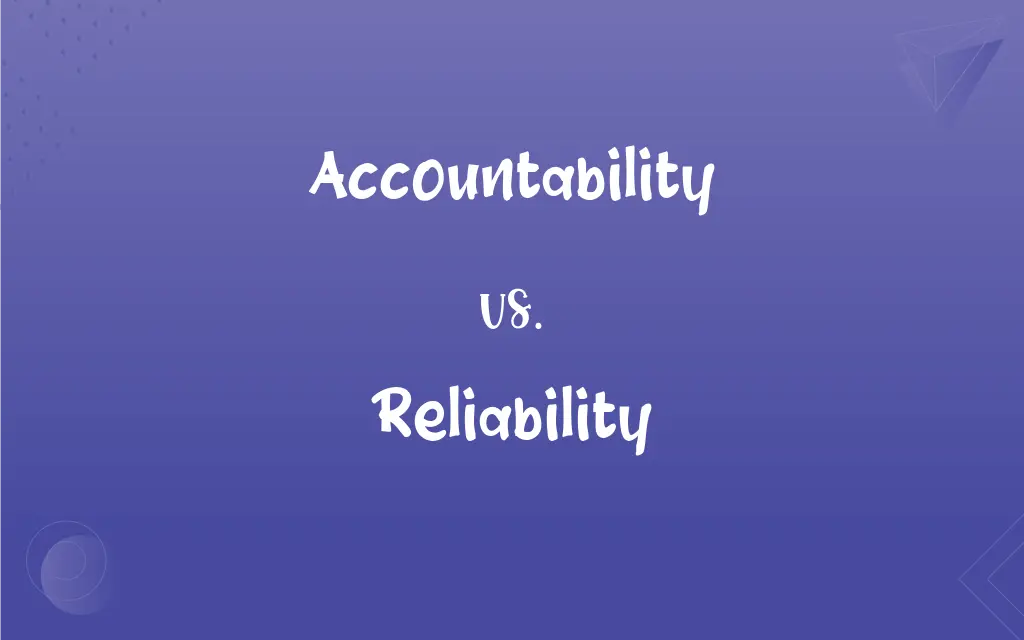Accountability vs. Reliability: What's the Difference?
Edited by Aimie Carlson || By Janet White || Updated on October 11, 2023
Accountability refers to being responsible for one's actions, while reliability denotes dependability and consistency in performance.

Key Differences
Accountability and reliability are two qualities highly valued in various domains, but they have distinct implications. Accountability emphasizes one's responsibility to answer for their actions, whether they result in success or failure. It embodies the idea of owning up to one's decisions and their consequences. On the other hand, reliability speaks to a consistency in performance and the ability to be depended upon.
In a workplace scenario, an employee might be held accountable for the outcome of a project, meaning they bear responsibility for its success or failure. However, their reliability could be gauged by how consistently they deliver quality work on time. It's possible for someone to be reliable in their duties but, in a situation gone awry, avoid accountability.
Conversely, an individual might consistently take accountability for their actions, owning up to mistakes or failures, but lack reliability in their performance. For example, if a person admits to their repeated tardiness but continues to be late, they show accountability but not reliability.
Both accountability and reliability are integral to trust. While accountability builds trust through transparency and responsibility, reliability builds it through consistent and dependable actions.
Comparison Chart
Primary Definition
Being responsible for one's actions.
Consistency and dependability in performance.
ADVERTISEMENT
Key Focus
Responsibility for outcomes.
Consistent delivery.
In Practice
Owning up to decisions and their results.
Regularly meeting expectations.
Trust Factor
Built through transparency and responsibility.
Built through consistent and dependable actions.
Example Scenario
Admitting to a mistake in judgment.
Consistently completing tasks on time.
Accountability and Reliability Definitions
Accountability
The obligation to answer for an activity.
Accountability in governance is crucial for democracy.
ADVERTISEMENT
Reliability
Consistency in performance or behavior.
The car's reliability made it a top choice among buyers.
Accountability
Bearing the consequences of one's actions.
With great power comes great accountability.
Reliability
Trustworthiness in fulfilling obligations.
The bank is known for the reliability of its services.
Accountability
Responsibility for one's actions or decisions.
Jane showed accountability by admitting her oversight.
Reliability
The quality of being dependable.
The reliability of the software made it popular among users.
Accountability
The state of being held to a standard or expectation.
The new policy increased managerial accountability.
Reliability
The ability to produce the same results under the same conditions.
The experiment's reliability was tested by repeating it multiple times.
Accountability
Being answerable for outcomes.
As the team leader, Mark felt the accountability for the project's result.
Reliability
Being a consistent and trustworthy source.
His reliability as a researcher was unquestioned.
Accountability
Expected or required to account for one's actions; answerable.
Reliability
Capable of being relied on; dependable
A reliable assistant.
A reliable car.
Accountability
Capable of being explained
An accountable phenomenon.
Reliability
Yielding the same or compatible results in different clinical experiments or statistical trials.
Accountability
The state of being accountable; liability to be called on to render an account or give an explanation; liability to be held responsible or answerable for something.
Reliability
The quality of being reliable, dependable, or trustworthy.
Accountability
An open determination of one's responsibility for something and imposition of consequences.
Reliability
(education) the ability to measure the same thing consistently (of a measurement indicating the degree to which the measure is consistent); that is, repeated measurements would give the same result (See also validity).
Accountability
Good-faith acceptance of one's responsibility for something and of its consequences.
Reliability
(engineering) measurable time of work before failure
Accountability
(military) The obligation imposed by law or regulation on an officer or other person for keeping accurate record of property, documents, or funds. The person having this obligation may or may not have actual possession of the property, documents, or funds. Accountability is concerned primarily with records, while responsibility is concerned primarily with custody, care, and safekeeping.
Reliability
The state or quality of being reliable; reliableness.
Accountability
The state of being accountable; liability to be called on to render an account; the obligation to bear the consequences for failure to perform as expected; accountableness.
Reliability
The trait of being dependable or reliable
Accountability
Responsibility to someone or for some activity
FAQs
Is accountability more about outcomes or processes?
It's more about outcomes, but the processes leading to those outcomes can also be factors in accountability.
Does being accountable always imply being reliable?
No, one can take responsibility for actions (accountable) without consistently performing well (reliable).
How can reliability be measured?
Through repeated testing or evaluation of consistency in performance over time.
Does accountability always involve consequences?
Typically, yes. Accountability often involves facing the consequences of one's actions, whether positive or negative.
Can someone be reliable without being accountable?
Yes, one can consistently perform well (reliable) without taking responsibility for outcomes (accountable).
Why is accountability important in leadership?
It fosters trust, transparency, and a sense of responsibility in decision-making.
Can a product be described as accountable?
Not typically. Products can be described as reliable, but people or entities are usually described as accountable.
Can organizations be both accountable and reliable?
Yes, organizations can take responsibility for their actions and also deliver consistently.
Is reliability a measure of consistent quality?
Yes, reliability often denotes consistent quality in performance or output.
How can one improve accountability?
By setting clear expectations, owning up to mistakes, and implementing feedback.
What's a key benefit of being reliable?
Building trust with others, as they know what to expect from you consistently.
Are reliable people always predictable?
Not always, but their actions and performance are generally consistent.
How does reliability relate to trust?
Reliability builds trust as people or products that are reliable can be depended upon consistently.
Does reliability equate to perfection?
No, it equates to consistent performance, not necessarily perfect performance.
Is reliability innate or can it be developed?
While some might naturally be more reliable, it's a trait that can be cultivated with effort and intention.
In what scenarios is accountability crucial?
In leadership, decision-making, and any situation where actions affect others or outcomes.
Is accountability a trait or action?
It can be seen as both; an inherent sense of responsibility (trait) and the act of owning outcomes (action).
Can something be too reliable?
In some contexts, being overly consistent without adaptability might not be advantageous.
How does accountability relate to transparency?
Accountability often involves transparency, as one has to be open about actions and their outcomes.
Does accountability imply blame?
Not necessarily. While accountability can involve facing negative consequences, it also encompasses owning positive outcomes.
About Author
Written by
Janet WhiteJanet White has been an esteemed writer and blogger for Difference Wiki. Holding a Master's degree in Science and Medical Journalism from the prestigious Boston University, she has consistently demonstrated her expertise and passion for her field. When she's not immersed in her work, Janet relishes her time exercising, delving into a good book, and cherishing moments with friends and family.
Edited by
Aimie CarlsonAimie Carlson, holding a master's degree in English literature, is a fervent English language enthusiast. She lends her writing talents to Difference Wiki, a prominent website that specializes in comparisons, offering readers insightful analyses that both captivate and inform.
































































